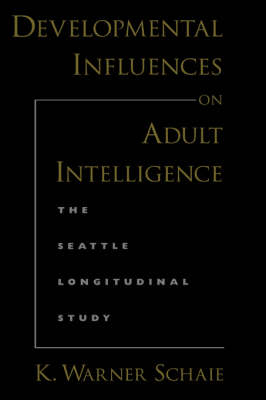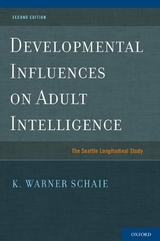
Developmental Influences on Adult Intelligence
Oxford University Press Inc (Verlag)
978-0-19-515673-7 (ISBN)
- Titel erscheint in neuer Auflage
- Artikel merken
In Developmental Influences on Adult Intelligence, Warner Schaie lays out the reasons why we should continue to study cognitive development in adulthood, and presents the history, latest data, and results from the Seattle Longitudinal Study (SLS), which now extends to over 45 years. From his work on the SLS, Schaie derived a conceptual model that he presents in this volume. The model represents his view on what influences cognitive development throughout the lifespan, and provides a rationale for the various influences that he investigated - genetic factors, early and current family environment, life styles, the experience of chronic disease, and various personality attributes. The data in this volume include the 1998 longitudinal cycle of the SLS. In light of both new data and revised analyses, psychometric and neuropsychological assessments have been linked in long-term data to aid in the early identification of risk for dementia in later life. Schaie also presents new data and conclusions on the impact of personality on cognition.
K. Warner Schaie is the Evan Pugh Professor of Human Development and Psychology at the Pennsylvania State University. He also holds an appointment as Affiliate Professor of Psychiatry and behavioral Science at the University of Washington. He received his Ph.D. in psychology from the University of Washington, an honorary D. Phil from the Friedrich Schiller University of Jena, and an honorary Sci D. from West Virginia University. He has authored or edited more than 250 articles and chapters on the psychology of aging, and 42 books, including the textbook, Adult Development and Aging (with S.L. Willis), and the Handbook of Psychology of Aging (with J.E. Birren), both now in their fifth editions.
1. Introduction and preview; 2. Methodological Issues; 3. The Database; 4. Cross-sectional studies; 5. Longitudinal studies; 6. Studies of cohort and period differences; 7. Intervention studies; 8. Methodological studies; 9. The relationship between cognitive styles and intellectual functioning; 10. Health and maintenance of intellectual functioning; 11. Life style variables that affect intellectual functioning; 12. The sequential study of personality traits and attitudes; 13. Influences of personality on cognition; 14. Family studies of intellectual abilities in adulthood; 15. Subjective perceptions of cognitive change; 16. Influences of family environment on cognition; 17. The role of longitudinal studies in the early detection of dementia; 18. Summary and conclusions; Appendix
| Erscheint lt. Verlag | 3.2.2005 |
|---|---|
| Zusatzinfo | numerous tables, graphs and line drawings |
| Verlagsort | New York |
| Sprache | englisch |
| Maße | 158 x 234 mm |
| Gewicht | 845 g |
| Themenwelt | Geisteswissenschaften ► Psychologie ► Allgemeine Psychologie |
| Geisteswissenschaften ► Psychologie ► Entwicklungspsychologie | |
| ISBN-10 | 0-19-515673-0 / 0195156730 |
| ISBN-13 | 978-0-19-515673-7 / 9780195156737 |
| Zustand | Neuware |
| Haben Sie eine Frage zum Produkt? |
aus dem Bereich



